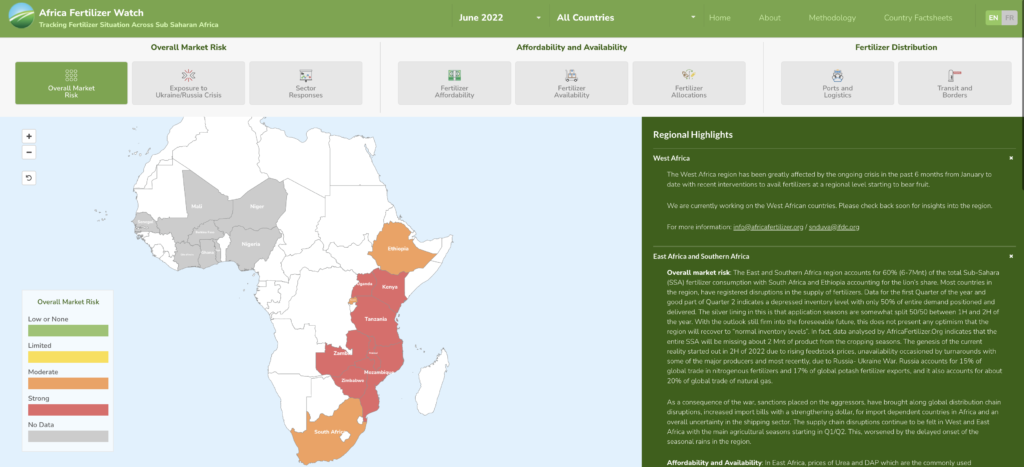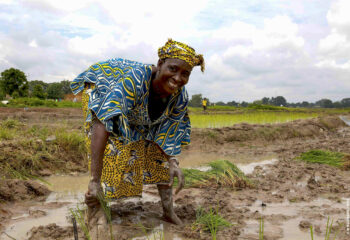
Nairobi – 24 July 2022
Today, the International Fertilizer Development Center (IFDC), AfricaFertilizer.org (AFO), and Development Gateway released an update to the Africa Fertilizer Watch. Currently monitoring ten countries in Eastern and Southern Africa, the tool has added indicators to track the impact of the Russia-Ukraine conflict on fertilizer delivery and use to identify changes in productivity and food security across the continent. The Africa Fertilizer Watch supports efficient and effective responses to the evolving food and fertilizer crises and ensures that sufficient quantities of appropriate fertilizers reach farmers.
Currently, SSA has the lowest fertilizer usage in the world – insufficient to replace the soil nutrients lost every year to crop production. In addition, huge demographic shifts in SSA could have a major impact on food security. Understanding where and how barriers to fertilizer access and availability are affecting farmers is crucial for agricultural productivity.
The Africa Fertilizer Watch was developed through a partnership between IFDC’s AFO initiative and Development Gateway. It is jointly funded by the U.S. Agency for International Development (USAID) Bureau for Resilience and Food Security, through the Feed the Future Soil Fertility Technology Adoption, Policy Reform, and Knowledge Management under the Sustainable Opportunities for Improving Livelihoods with Soils (SOILS) Consortium, and the Bill & Melinda Gates Foundation, through the Visualizing Insights on Fertilizer for African Agriculture (VIFAA) program. Other technical partners include the African Fertilizer and Agribusiness Partnership (AFAP) and AFRIQOM.
Russia is the world’s largest exporter of fertilizers. Given that the continent of Africa relies on Russia for some of its fertilizer needs, the Africa Fertilizer Watch monitors the impact of the Russia-Ukraine conflict on fertilizer market systems in SSA. Other key indicators are related to the affordability and availability of fertilizer within the SSA region.
Africa Fertilizer Watch: Tracking the Fertilizer Situation Across Sub-Saharan Africa
The Africa Fertilizer Watch is publicly available online and monitors eight indicators: overall fertilizer market risk with regard to stock levels and supply anomalies, availability, affordability, and distribution measures to track and visualize the Russia-Ukraine conflict’s impact on access to and use of fertilizers across Africa. It also monitors how countries are allocating fertilizer, whether for food production or otherwise, in light of the global fertilizer crisis; government responses to the ongoing crisis; and fertilizer-specific measures and/or logistical issues affecting the movement of fertilizers from ports to farms (ports, roads, borders, retail, stocks, and sector-wide responses).
Data on the Russia-Ukraine conflict is obtained from various public press releases, with overall market risk, affordability/availability, and distribution bottlenecks coming from direct communications by fertilizer stakeholders and regional fertilizer associations, ministerial press releases, local media reporting, and information from other relevant trackers. The Africa Fertilizer Watch checks the different sources periodically for new data on each of the dashboard’s supported countries, updating the overall market risk indicator as needed. More information about the methodology can be found on the Africa Fertilizer Watch website.
Partners
This project grew out of an existing partnership between AFO and Development Gateway, working together on the VIFAA program, supported by the Bill & Melinda Gates Foundation. VIFAA is designed to holistically address the supply, demand, and use of fertilizer data at both country and regional levels through country-specific dashboards and visualization tools.
International Fertilizer Development Center (IFDC) – As an independent non-profit organization, IFDC works throughout Africa and Asia to increase soil fertility and develop inclusive market systems. Combining science-backed innovations, an enabling policy environment, holistic market systems development, and strategic partnerships, the organization bridges the gap between identifying and scaling sustainable agricultural solutions, resulting in improved household food security and enriched family livelihoods around the world. Using an inclusive approach, IFDC employs locally driven solutions that are environmentally sound and impact oriented that bring change at local, regional, and national levels.
Sustainable Opportunities for Improving Livelihoods with Soils (SOILS) Consortium – IFDC has implemented the USAID-funded Bureau for Resilience and Food Security Feed the Future Sustainable Opportunities for Improving Livelihoods with Soils (SOILS) Consortium (BRFS-SFT-SOILS) program since 2015. The project bridges the gap between scientific research and technology dissemination to smallholder farmers. BRFS-SFT conducts research with partners from universities, national and international research and development institutions, and the private sector. The overall goal of SOILS is to offer practical, profitable, scale-appropriate soil, and land-use management technologies and recommendations for healthier and productive farming systems globally. SOILS priority areas include developing and transferring soil fertility technologies that improve nutrient use efficiency, in alignment with the 4Rs of Nutrient Stewardship: right source, right time, right rate, and right place. This is achieved by strengthening inorganic fertilizer-based systems and promoting integrated soil health and fertility management practices for optimal economic returns, focusing on smallholder cropping systems.
AfricaFertilizer.org (AFO) – the premier source for fertilizer statistics and information in Africa. It is hosted by IFDC and supported by several partners, key among them being the International Fertilizer Association (IFA), Argus Media, and the Bill & Melinda Gates foundation through Development Gateway under the VIFAA program. Since 2009, AFO has been collecting, processing, and publishing fertilizer production, trade, and consumption statistics for the main fertilizer markets in sub-Saharan Africa. AFO has an extensive network of fertilizer industry players in the main fertilizer trade corridors and maintains key information on the major producers, their production facilities and capacities, importers/suppliers, and various distribution channels.
Development Gateway (DG) – provides data and digital solutions for international development. DG creates tools that help institutions collect and analyze information; strengthen institutional capability to use data; and explore what processes are needed to enable evidence-based decisions. A mission-driven nonprofit since 2000 with staff based in five global hubs and around the world, DG supports the use of data, technology, and evidence to create more effective, open, and engaging institutions. DG helped co-create the Africa Fertilizer Watch and is the lead implementer of the four-year Visualizing Insights on Fertilizer for African Agriculture (VIFAA) program.
African Fertilizer and Agribusiness Partnership (AFAP) – an independent non-profit organization founded in 2012 by a partnership of African development organizations. It was built on the work of the Comprehensive Africa Agriculture Development Programme (CAADP), a framework for achieving ambitious agriculture development goals set by African nations and leaders. AFAP implements sustainable development projects and advises the public sector, private sector clients, non-governmental organizations (NGOs), and donors on policies and market-driven business solutions in the agriculture inputs and agribusiness value chain. AFAP is a technical partner of the Africa Fertilizer Watch
AFRIQOM – an independent privately held firm that provides market research, analytics, trading intelligence, and consultancy studies, with a focus on African fertilizer markets. By doing so, and being the leaders on the continent, AFRIQOM brings transparency to an opaque market to help and contribute to an Africa Green Revolution. AFRIQOM has recently launched the AFRIQEVENTS program, in partnership with major associations, for conferences around the continent that offer a novel platform to develop the fertilizer consumption rate in Africa.




